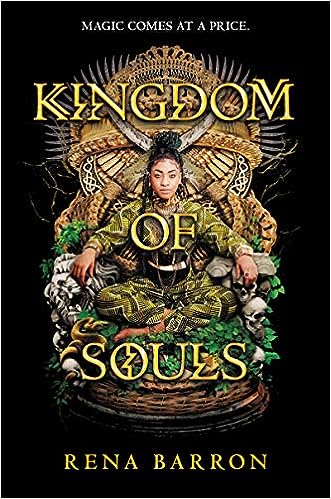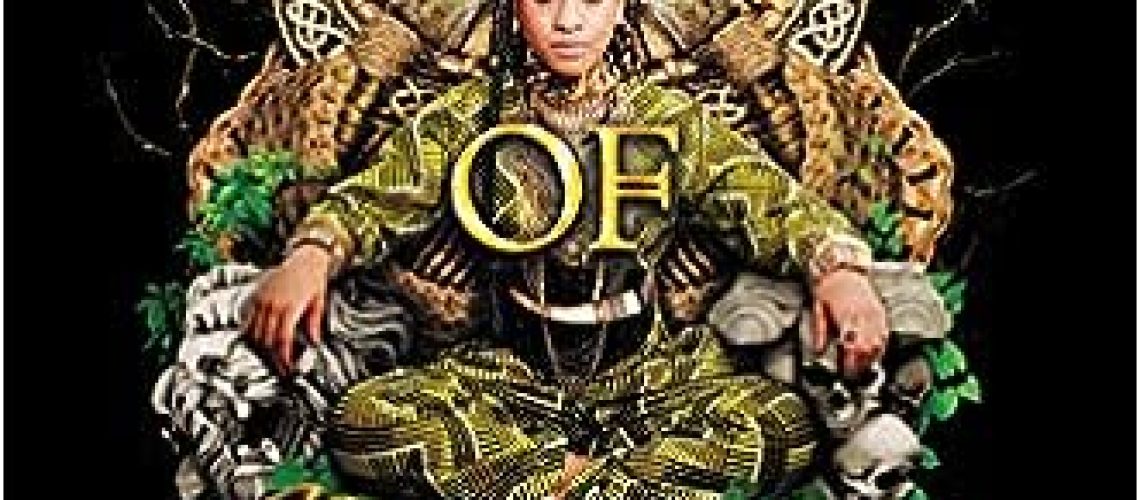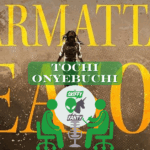Kingdom of Souls is an ambitious YA epic set in a West-African inspired fantasy world. It is a place alive with magic, where orishas interfere with the lives of humans, and where it is up to one young woman to save the world from the Demon King.

As the daughter of two powerful magic users, big things are expected of Arrah. However, while she is able to see magic, she has never manifested signs of having any herself other than a natural resistance to mind-influencing spells. When a friend of hers disappears as part of a spate of child kidnappings, Arrah takes desperate measures to find out what’s going on: she sells years of her life in exchange for the ability to cast a single spell.
The world of Kingdom of Souls is a complicated one and the beginning is a little slow while everything is laid out. Effectively, readers get two introductions. The first follows Arrah and her father as they return to his homeland in order to take part in the gathering of the Five Tribes. This event only takes place once every four years and is when the children of the tribes are tested for magic. At sixteen, this is Arrah’s last chance to demonstrate magical talent before she comes of age. This introduction sets up the magic system of the world and its ties to religion. Indeed the gathering Arrah attends is in honour of Heka, the deity who gave the nomadic tribes their magic.
This introduction also establishes Arrah’s relationships with her father and grandmother, the latter of whom is the chieftain of one of the tribes. While Arrah has an affectionate relationship with her father, she sees her grandmother first and foremost as the chieftain rather than a relative, as her grandmother is the person responsible for administering Arrah’s magic tests. Arrah feels enormous pressure to pass these tests and can’t understand why her grandmother seems unfazed when she fails year after year.
The second introduction comes when Arrah and her father return home to the neighbouring Kingdom. This is Arrah’s home and a significant focus of the story. The reader is introduced to the uneasy relationship Arrah has with her mother, Arti, and gets to witness firsthand the power Arti wields in the Kingdom as the Head Seer. On returning from the tribes, Arrah is given no chance to slip back into her routine, but dragged along by her mother to an important public meeting. Here the politics of the place are laid out, particularly Arti’s feud with the Vizier and the kingdom’s reverence for the orishas.
Power is a key theme of the novel. In the beginning, Arrah keenly feels her lack of magic and we see how this makes her even more of an outsider within the tribes. When threatened by bullies, she has no way to defend herself or even escape. But this sense of powerlessness isn’t restricted to Arrah. Indeed, one of the more interesting aspects of the book is the way it shows situations where those with power are rendered helpless. This is particularly illustrated through Arrah’s parents and even, arguably, her grandmother. For example, Arti had enough power at age fourteen to be declared heir to the chieftain of her tribe. Yet as a young woman, she was still unable to protect herself from trauma inflicted on her at the instigation of the Vizier. In many respects, the book resembles the law of the wild: no matter how big you are, there’s always someone bigger (and willing to eat you).
Unsurprisingly then, this is quite a dark story. It features child abduction and murder, mind-rape, possession/lack of control over one’s body, blood magic, and emotional abuse. And while the story starts out as a pretty clear story of good vs evil, it quickly becomes apparent that things aren’t so straightforward. When the signs begin to indicate demons are working to free their king from the orishas’ imprisonment, Arrah realises that the orishas haven’t been entirely truthful about the extinction of the demons and starts to wonder what else they might have lied about.
Arrah herself makes for an interesting character and a study in contrasts. She starts out as a bit of a brat, an immaturity entirely suitable for her age and perhaps also arising from her position of privilege as the descendant of a chieftain and two powerful magic users. However, as the story progresses, she never shies from accepting responsibility; she’s not content to be a bystander while terrible things happen. And while she begins with an uncomfortable desperation for magic, it’s not for the sake of her own power that she breaks the taboo and sells her years for a spell. It’s only when a friend is in grave trouble that she crosses that line.
Although her friend serves as a catalyst, Arrah’s friends in general are rather flat characters. With the exception of her love interest, not much time is spent with these characters, who seem to be there mostly to bail Arrah out of trouble. I found this disappointing, since they had the potential to be interesting characters in their own right. I hope that they will get more screen time in the sequels. And indeed, one of the things I particularly appreciated is that Arrah and her love interest had separate friendship groups, making them seem more like independent people.
While Arrah’s friendships may have seemed a little flat, her family relationships are more rounded out. As already mentioned, Arti has something of a traumatic backstory and Kingdom of Souls looks at how this plays into her relationship with Arrah. One of the reasons Arrah is so desperate to manifest magic is in the hopes it will repair her relationship with her mother, as Arti has made no secret of her disappointment at her daughter’s lack. Arti is a cold mother, distant and more interested in city politics than family. This provides a strong contrast with Arrah’s father, a warm and friendly man who is popular but nevertheless remains a bit of an introvert. It is clear he loves his daughter, inviting her to work in the garden with him and taking time to tell her stories. I rather enjoyed this inversion of traditional Western gender roles.
Yet, I’d consider Kingdom of Souls to be more of a plot-driven book than a character-driven one. The story takes a number of twists and turns, steadily becoming more epic in scale. The pacing is a little uneven, slow in the beginning, then jerking into action for a short time before slowing again (perhaps a little too much so) in the middle to allow some time to pass and to develop some new circumstances for Arrah’s family. Then it careens through to the finale. And what a finale it is!
Overall, I found Kingdom of Souls a promising start to a new series.
[Editor’s Note: Publication of this review was inadvertently delayed. Two sequels, Reaper of Souls and Master of Souls, are now available.]







